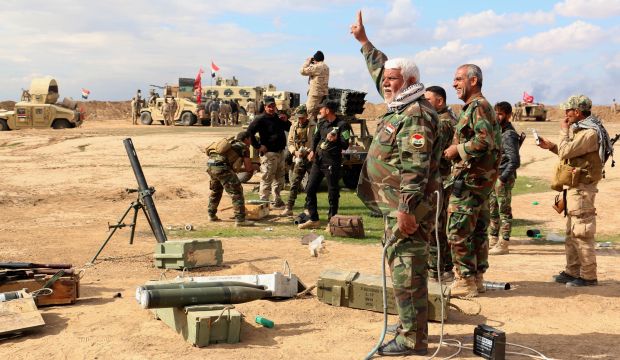A conflict with the Islamic State of Iraq and Syria (ISIS) in Iraq was always an inevitability because there are only two possible outcomes: Either you chase them, or they chase you. There is no border demarcation, and no one recognizes the authority of the other. Iraqi forces are now taking the lead in the city of Tikrit, one of the two most important cities seized by ISIS in Iraq.
Iraqi forces have also gained ground in most of Salah Al-Din province and will most probably completely liberate it from terrorist groups, if only for a short period of time. This is because there are Iranian forces and sectarian militias fighting alongside the Iraqi army who will sadly replace ISIS. Photos and information coming out of Salah Al-Din confirm that these forces have already committed sectarian-motivated crimes.
The liberation of Tikrit and indeed every inch of Iraqi territory is a national duty that amply demonstrates the integrity of the state’s authority. Tikrit and its environs must remain under the authority of the Iraqi state.
However, if the aim is simply to take control of Tikrit and expel ISIS, allowing sectarian infighting and partisan alliances, then this will only be a temporary victory. Under such conditions, ISIS will certainly return to take control of Tikrit, and with local popular support. The war now has clear sectarian and ethnic dimensions, with Iranian-backed militias intimidating the inhabitants of these besieged regions.
Most of the military activities on the ground are being aided by the West. The US is providing precious intelligence, observing the movements of terrorists and monitoring the status of the territories under their control.
What is unfolding in Iraq more resembles a Sunni-Shi’ite conflict that has nothing to do with liberating territory from ISIS. Will Iraqi Prime Minister Haider Abadi, commander-in-chief of Iraq’s armed forces, be able to stop the sectarian war after ISIS are driven out? Unfortunately Iraq’s Sunni community have now been angered by him and his policies, even through they were happy when he first took up the post and pledged to work towards reconciliation. Believing that he has failed to meet these promises, Iraq’s Sunnis now view Abadi as being weak.
They fear that the situation in Iraq will deteriorate even further and become completely out of control. There are fears of Iraq facing the same fate as Syria where the situation on the ground has turned into ongoing battles between the Alawites and the Sunnis. Even if the regime in Damascus is dismissing this reading of the situation, this is something that has become increasingly clear, particularly following the involvement of Hezbollah and the Islamic Revolutionary Guard Corps.
The Americans have to understand the nature of the conflict. They have found themselves dragged back to Iraq because of ISIS provocations and the threat it represented to the Iraqi government during the final days of former prime minister Nuri al-Maliki’s term. His administration sustained a number of defeats which enabled extremists to seize important sites and even threaten the capital.
The Americans played an active role in the transfer of power from Maliki to Abadi, and later acknowledged that Maliki’s policies were responsible for the situation the country had reached. Despite this, they now find themselves part of a camp that is pursuing similar policies to Maliki, namely assisting sectarian groups.
They might be able to liberate all of Iraq’s territory and eradicate ISIS and other rebels, but this would just be a prelude to a new sectarian conflict, similar to the one currently raging in Syria. How will the United States benefit from supporting the Iraqi army without a political process that ensures that one side is not backed at the expense of all others?
The Americans must realize that they have now become part of the region’s repugnant sectarianism, fighting alongside Alawites in Syria and Shi’ites in Iraq, while negotiating with Shi’ite Iran on the nuclear issue. All three scenarios have a negative impact on the region’s Sunni community, or at least this is how it seems. The Americans have placed themselves in an unprecedented, terrible trap.
We hoped, and are still hoping, that the United States will participate in isolating Assad, the Syrian regime and its sectarianism, and support the moderate opposition that includes all religions and ethnic groups. We hope that Washington will refrain from supporting the government in Baghdad unless it agrees to become representative of all Iraqis.
Widening the sectarian wars in the region will not serve the West. Al-Qaeda, ISIS, the Al-Nusra Front, Hezbollah, Asaib Ahl al-Haq and others are nothing more than the outcome of these blind policies. The West should help promote moderate civilian institutions against religious hardliners, not support the extremists to achieve any kind of victory, whatever the justification.
